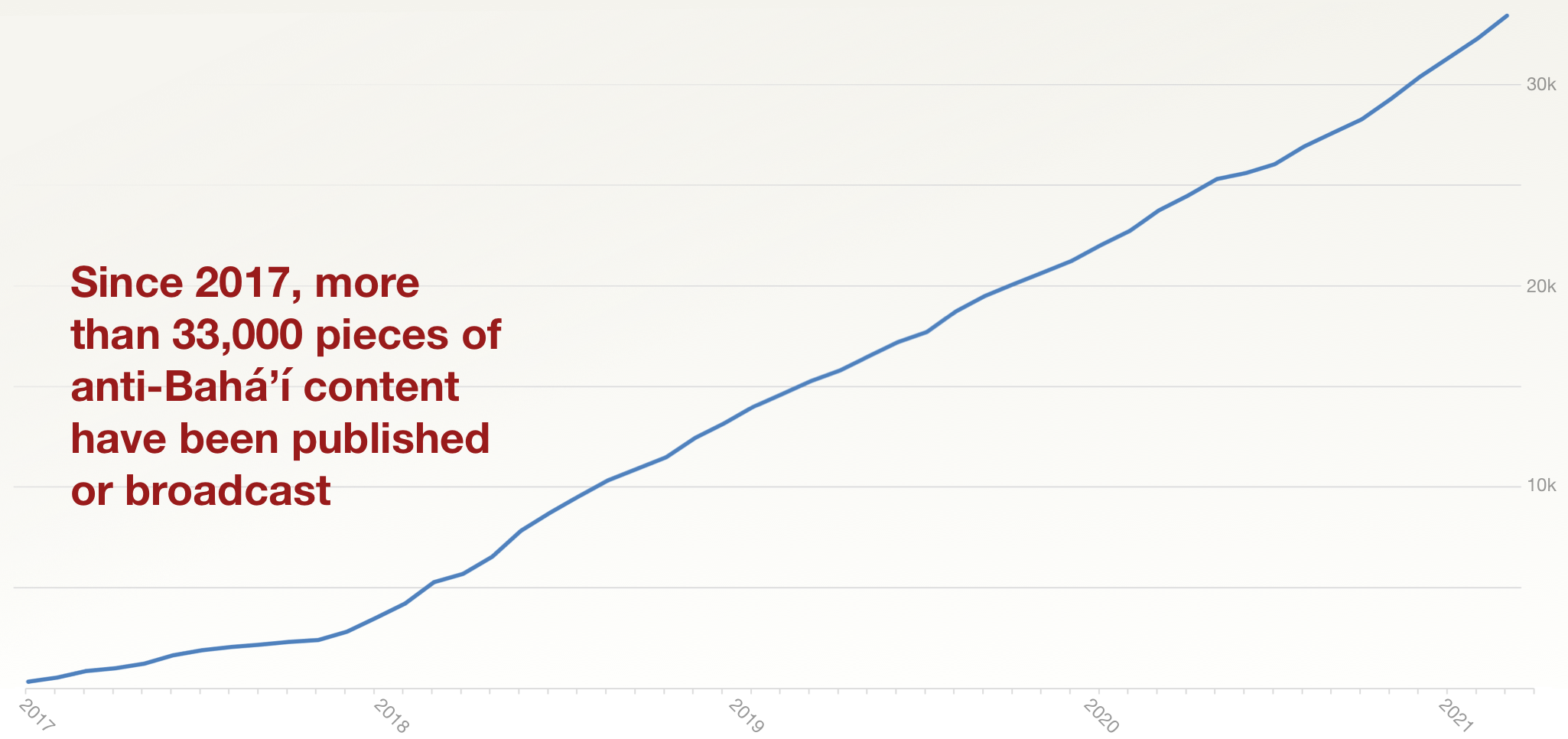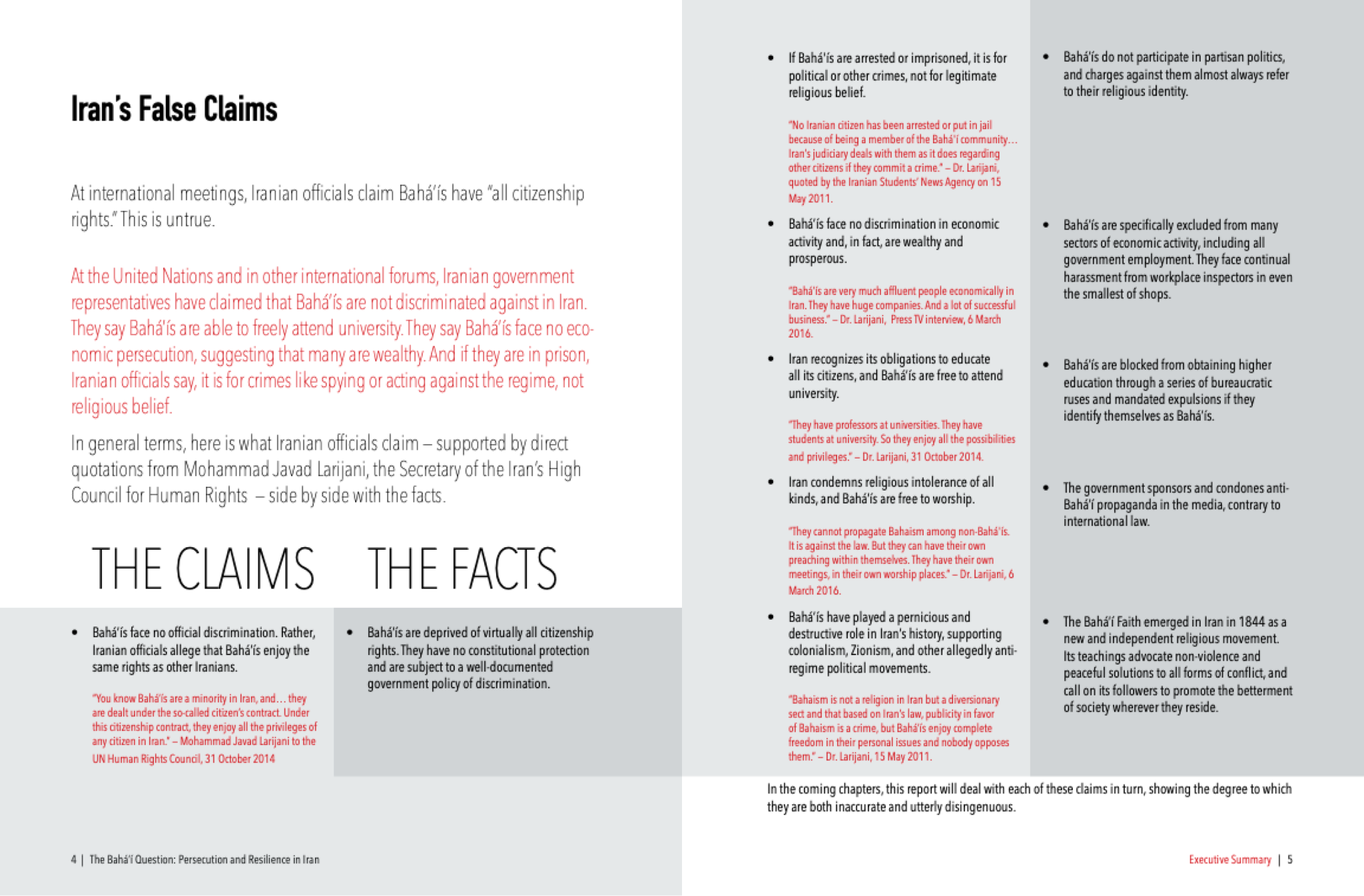The Situation of Bahá’ís in Iran
State-sponsored hate propaganda against Iranian Bahá’ís
Iran’s state-sponsored campaign of hatred against the Bahá'í Faith has been on the rise across all media platforms, including the web, social media, radio, newspapers, and television.
History shows that persecution can escalate to the most grievous crimes in a climate of disinformation, hatred and propaganda.

Since the Islamic Revolution in 1979, the Iranian government has waged a relentless anti-Bahá’í propaganda campaign online and in the media, as well as through educational seminars, exhibitions and informal communications. This has continued and intensified in recent years.
Every month, hundreds of anti-Bahá’í articles and videos are published in Iran. Since 2017, more than 33,000 pieces of anti-Bahá’í content have been published or broadcast. In recent years, hundreds of websites and dozens of social media accounts have systematically attacked the Bahá’í Faith. During the first four months of 2021, there was an increase of 44% compared to the previous year.

These are commonly-used images that present the Bahá’í Faith as “Satanic” or “deviant,” or as agents or spies for Israel and Western countries.
A rise in hate propaganda
This rise in hate propaganda is part of the four-decade-long, government-led effort to arouse feelings of suspicion, distrust, and hatred for the Bahá’í population of Iran. A study of thousands of pieces of anti-Bahá’í propaganda found that nearly every article surveyed misrepresents Bahá’í beliefs in a manner designed to cause maximum offence to Iran’s Muslim majority population. This campaign of hate propaganda has led to acts of violence against the Bahá’ís, carried out with complete impunity.
Indeed, the purpose of spreading and disseminating this false information and hateful propaganda is to demonize and vilify Bahá’ís, and provoke public hatred, violence – and even murder – against them by their neighbours and fellow citizens. Under these circumstances, the oppression is presently unfolding with greater intensity.
History has shown that the hatred of an entire population can be stirred up by such a relentless, systematic repetition of falsehoods and myths. When aroused citizens take violent action against their neighbours – whom they have been repeatedly told are traitors, corrupt or unclean – the offending authorities can absolve themselves of responsibility by blaming the actions on the populace.
A campaign of demonization
The Bahá’í Faith is known the world over as an independent world religion. Its teachings advocate progressive ideals like the equality of women and men. It emphasizes obedience to government, non-involvement in partisan politics, and assiduous efforts to promote the betterment of society. In addition, its moral code asks followers to uphold the highest standards of chastity, honesty, and trustworthiness.
Yet according to the picture painted by the Iranian media, Bahá’ís are “misguided” or “deviant” “Satanists” whose main concern is to overthrow the government through methods like the “corruption” of youth or spreading “propaganda against the regime.”
A detailed examination by the Bahá’í International Community of anti-Bahá’í propaganda identified recurring messages that are intended to instill a belief or feeling that Bahá’ís are outsiders in their own land, who deserve to be discriminated against – and perhaps even subjected to violence.

In 2016, the Bahá’í International Community’s United Nations Office published “The Bahá’í Question Revisited: Persecution and Resilience in Iran,” which summarized the main features of the Bahá’í persecution, including a state-sponsored campaign of hate propaganda. View PDF
The growth of online hate
There are thousands of examples of anti-Bahá’í materials in circulation, often shared via government-sponsored or pro-government websites and social media platforms. A cursory search of these materials points to more than 100 separate websites hosting anti-Bahá’í content. These websites include the Ministry of Culture and Guidance, the semi-official Kayhan news site, and the personal websites of clerics like Ayatollah Safi Golpaygani and Ayatollah Subairi Zanjani – along with other news sites and propaganda outlets.
There are also vast online libraries containing hundreds of anti-Bahá’í books claiming to be objective research into the Bahá’í Faith, but which have the aim of distorting Bahá’í history and beliefs.
Many videos and documentary programs are filled with baseless accusations against Bahá’ís and false information about Bahá’í beliefs and the Bahá’í community, which are produced with the aim to misleading the public about the Bahá’ís.
Dozens of YouTube, Instagram, and Telegram channels host anti-Bahá’í content that is intended to perpetuate misinformation and hatred.
Iran’s response
In their public rhetoric, Iranian officials have claimed to support the ideals of religious tolerance and freedom that are today deeply woven into the fabric of international law and human rights norms. Iranian officials have also vocally supported international efforts to combat various forms of incitement to hatred or violence over religious belief.
The reality however is in direct contradiction to these efforts.
The Iranian government has actively supported the spread of hate propaganda. The Bahá’ís in Iran are not given the right to reply to any of these baseless accusations, either in the media or any other outlet.
Despite routine denials by Iranian officials, the government’s 40-year, systematic persecution of its Bahá’í citizens has been well documented, offering facts that prove Iran’s violations of international law with respect to guarantees of religious freedom – along with violations of legal due process and other basic human rights that have touched not only Iranian Bahá’ís but many other Iranian citizens.
Documents and Media
- Archives of Bahá'í Persecution in Iran
- Inciting Hatred: Iran's Media Campaign to Demonize Bahá'ís (2011)
- Statement by MP Cathay Wagantall (22 June 2021)
- Statement by MP Hon. Judy Sgro (28 June 2021)
- Bahá'í International Community: "A machinery of hate: increasing propaganda raises concern for Baha’is" (8 July 2021)
- Statement by CIJA (9 July 2021)
- Statement by MP Kerry Diotte (10 July 2021)
- Statement by Dr. Mark Freiman (13 July 2021)
- Bahá'í World News Service: “This must stop”: Anti-Bahá’í propaganda intensifies in Iran, evokes global outcry (13 July 2021)
- Statement by Akaash Maharaj, Global Organization of Parliamentarians Against Corruption (15 July 2021)
- Statement by David Anderson, International Panel of Parliamentarians for Freedom of Religion or Belief (15 July 2021)
- Statement by Kaveh Shahrooz, MacDonald-Laurier Institute (15 July 2021)
- Statement by Kyle Matthews, Montreal Institute for Genocide and Human Rights Studies (15 July 2021)
- Statement by International Institute for Religious Freedom (20 July 2021)
- Joint Statement of Concern on the Rise in Anti-Bahá'í Propaganda by the Raoul Wallenberg Centre for Human Rights and Parliamentarians for Global Action (20 July 2021)